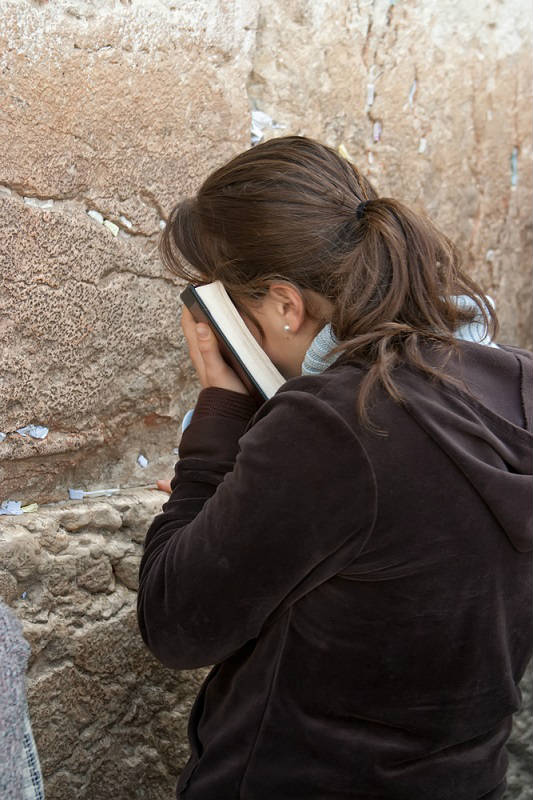How do you reconcile modern “hookup culture” and religious faith?
In today’s culture, almost every film or novel has a romantic interest, with a happily ever after, hot-and-heavy or at least casual kisses. Physical intimacy is portrayed as the way to achieve connection and depth of meaning. As a child, I sang Disney songs, waiting for my prince to come. I longed for connection and romance. If I had faith, my dream would come true.
Judaism purports that such a dream of connection and intimacy can indeed come true. Physical intimacy is the ultimate form of connection and pleasure — it is the merging of two souls into one. Sex is not a sin, but rather a beautiful aspect of marriage meant to be an ecstatic experience, bringing one closer to one’s spouse and G-d.
When channeled properly, it becomes one of the ways to connect to G-d through 613 obligations, mitzvoth. Judaism is a diverse and vibrant religion with various practices and customs and a common core of following these mitzvoth through halakhot – Jewish laws. The halakhot of taharat ha-mishpachah, the laws of family purity, and shomer negiah, essentially abstaining from touching someone of the opposite sex other than one’s spouse and immediate relatives, provide the framework for Jewish intimacy. These laws seem antithetical to the average college experience, but they need not be.
Activate the Soul
College life today is focused on the growth of the individual. It emphasizes the need to try new things, finding oneself in the external, while Judaism preaches searching internally. During my first couple years in such an environment, I participated in the “hookup culture” — my life fraught with meaningless physical contact, emotional tension and feelings of being used even by people I was “dating,” stress about possible pregnancy and sexually transmitted infections (STI), and spending money on various contraceptives.
At one point, I could no longer understand why I was doing this. I realized how unfulfilling these experiences were, lacking depth and caring, but it was frightening to pursue meaning in a culture that idolizes empty physical experience. I no longer wanted the physical divorced from emotional connection or commitment; I wanted depth, respect and understanding. I wanted to more selectively choose who saw and touched my body, but I did not yet have the tools to do so. After a couple years of allowing my body to dictate my actions, how could I actuate my soul?
Judaism asserts that through free choice one activates the soul and infuses every moment of life with spirituality. When one chooses to engage life according to G-d’s will, Judaism says he or she sanctifies mundane encounters (Kosher Sex). Physical intimacy is no exception. Lust, when controlled, channeled and satisfied in the proper time and manner, specifically between husband and wife, becomes a sanctified deed (Kosher Sex Mechon Mamre).
Many basic Jewish understandings of man and wife come from the paradigmatic relationship of Adam and Eve. Eve is formed from Adam’s side, and he remarks that she is “bone of my bones and flesh of my flesh” (Genesis 2:23). Bone, etzem, is the very structure, the anatomical core, on which human beings are built. Thus, man and wife should share similar core values. Flesh, basar, allows expression and interaction; spouses should see to understand and relate to each other. In Judaism, people are commanded to find their other halves, their basheret, for a man “shall leave his father and his mother, and cleave to his wife” (Genesis 2:24). Spouses must build each other, grow and create together.
One Flesh
Physical attraction must be part and parcel with emotional and spiritual compatibility. Judaism realizes the importance of physical attraction, dictating that a couple must meet at least once before marriage, and if either prospective spouse finds the other physically unattractive, they should not marry.
Severing the spiritual from the physical, in my experience, does not lead to successful or happy pairing. When physicality is expressed without spirituality, it creates a false connection. Sole physicality clouds judgment, overpowering through the release of pleasure and trust chemicals, thus obfuscating a detached assessment of emotional and mental compatibility. Although physical intimacy melds two souls into one, finding one’s soul mate largely depends on keeping physical desires at bay to emphasize emotional and spiritual compatibilities.
Judaism imposes stringent boundaries on touch and sexuality in order to create a space for total vulnerability in marriage. Though shomer negiah is a personal choice, with most people recognizing that we are all on our individual journeys in life, there are social pressures to uphold these norms that lead to discomfort in the community upon non-conformity. Yet what a person does in private is typically not discussed, and after one does t’shuvah, repentance, he or she is seen anew. Ultimately, the community wishes to keep touch sacred, and provide an atmosphere where that touch can be elevated with complete openness in marriage.
In college, the physical generally becomes objective, graded and guarded. Yet sexuality is itself a subjective, carnal and intimate expression of oneself and one’s connection to the other person. Judaism demands that men and women experience uninhibited physical intimacy, where they are not ashamed because of their complete commitment to each other.
Ramban, Rabbi Nahmanides, explains that Genesis 2:24 — “and they shall become one flesh” — refers to the need for complete nakedness; in this state two may become one. In complete abandon, the physical blends with the spiritual. Physical intimacy itself is referred to in Genesis 4:1 as “now the man knew his wife Eve.” The root yud-dalet-ayin forms the word “know” in Hebrew; vividly illustrating that Jewish intimacy involves “both the heart and mind, not merely the body.”
Once married, halakhot obligate an attention to pleasure in the relationship for a healthy marriage and increased connection to each other and G-d. Physical intimacy is the woman’s right (Issurei Biah 21:11 and Ishut 14:1), onah, which the husband must not neglect. The man must give to his wife regularly and ensure her pleasure: Yebamoth 62b calls a man who does not duly visit his wife, if he knows her to be G-d fearing, a sinner; Talmud Eruvin 100b outlines that a husband must make sure his wife is “ready” before they begin, learning “good manners from the rooster, who first coaxes and then mates.” The wife controls physical intimacy in the marriage, empowering her to be strong and proud of her nature. Pleasure is commanded for the benefit of the relationship, imbuing touch with meaning.
Physical intimacy is experienced only half of the month according to laws of taharat hamishpachah. Man and wife avoid touching during the time of niddah, from the first sign of blood until the evening after the woman’s seventh “clean day.” At the end of this period, the woman immerses herself in a mikvah or ritual bath, restoring corporeal equilibrium and giving a sense of renewal.
This separation keeps the physical’s novelty, positivity and pleasure. Furthermore, these purity laws allow, as Rabbi Shmuley Boteach explains, for man and wife to be both lover and friend, the coexistence of cool calm water and consuming fire.
The Greatest Pleasure is Found in Marriage
Judaism recognizes human nature and leverages it through these mechanisms and mitzvoth to create the space for higher spiritual expression and connection, dovetailing with even greater pleasure than diffuse physicality alone can provide.
The greatest pleasure is found in marriage. It is incredibly beautiful but difficult to remember at times in the college setting, unmarried and not dating. As an Orthodox Jew in college life, how do I survive?
On a daily basis, I practice shomer negiah, which sublimates touch. Those who observe this mitzvah are sensitized to physical contact. I feel able to truly appreciate the meaning of touch, sanctifying its meaning and power to connect people. It creates the physical sensitivity so that each touch, no matter how small, is exhilarating in many ways.
The casual hug and handshake are pervasive in the modern college atmosphere, making upholding shomer negiah stressful and challenging. However, I have found that if you do not initiate, as I no longer do, people tend not to mind. Yes, there are moments where people still go for a handshake. At these times, shomer negiah has an added layer of meaning: an expression of free will. It is no longer a social requirement but rather my choice. I must assess the situation, determining whether or not I would embarrass the person by declining — in this case I shake their hand, since embarrassing a person is tantamount to murder in Jewish thought.
I realize that I am strong enough to exercise my free will in shomer negiah because it is true to me and I have internalized it, making it my own. Through my awareness of the spiritual depth of touch, I feel able to make my own choices and not be dictated by society or carnal desires. Only when one understands the meaning of choice can one exert free will and imbue life with spirituality.
Moreover, I grow myself, have time with friends and make memories to last a lifetime. We are meant to yearn for our basheret; there are always moments of despair, but without darkness there could be no light. Searching for love, respect and understanding should not be compromised, and physicality without depth is not the ultimate cosmic expression of the love and intimacy that I crave.
It all comes down to waiting for what Drew Barrymore says in Never Been Kissed: “That thing, that moment, when you kiss someone and everything around becomes hazy and the only thing in focus is you and this person and you realize that that person is the only person that you’re supposed to kiss for the rest of your life, and for one moment you get this amazing gift and you want to laugh and you want to cry because you feel so lucky that you found it.”
The views expressed in this article are the author’s own and do not necessarily reflect Fair Observer’s editorial policy.
Photo Credit: Bikeriderlondon / Ekaterina Lin / Irina Borsuchenko / Shutterstock
 We bring you perspectives from around the world. Help us to inform and educate. Your donation is tax-deductible. Join over 400 people to become a donor or you could choose to be a sponsor.
We bring you perspectives from around the world. Help us to inform and educate. Your donation is tax-deductible. Join over 400 people to become a donor or you could choose to be a sponsor.
Support Fair Observer
We rely on your support for our independence, diversity and quality.
For more than 10 years, Fair Observer has been free, fair and independent. No billionaire owns us, no advertisers control us. We are a reader-supported nonprofit. Unlike many other publications, we keep our content free for readers regardless of where they live or whether they can afford to pay. We have no paywalls and no ads.
In the post-truth era of fake news, echo chambers and filter bubbles, we publish a plurality of perspectives from around the world. Anyone can publish with us, but everyone goes through a rigorous editorial process. So, you get fact-checked, well-reasoned content instead of noise.
We publish 2,500+ voices from 90+ countries. We also conduct education and training programs
on subjects ranging from digital media and journalism to writing and critical thinking. This
doesn’t come cheap. Servers, editors, trainers and web developers cost
money.
Please consider supporting us on a regular basis as a recurring donor or a
sustaining member.
Will you support FO’s journalism?
We rely on your support for our independence, diversity and quality.



















Comment
This is such a beautiful article, as is the author who wrote it. It does a great job of explaining a concept that is often difficult to understand within the context of today’s college environment, and enables those who might not practice shomer negiah or know anything about it to see the beauty in the practice. At the same time, it doesn’t shame those who participate in today’s “hookup culture”, and acknowledges that everyone’s spiritual and sexual journeys are unique and not to be shamed.